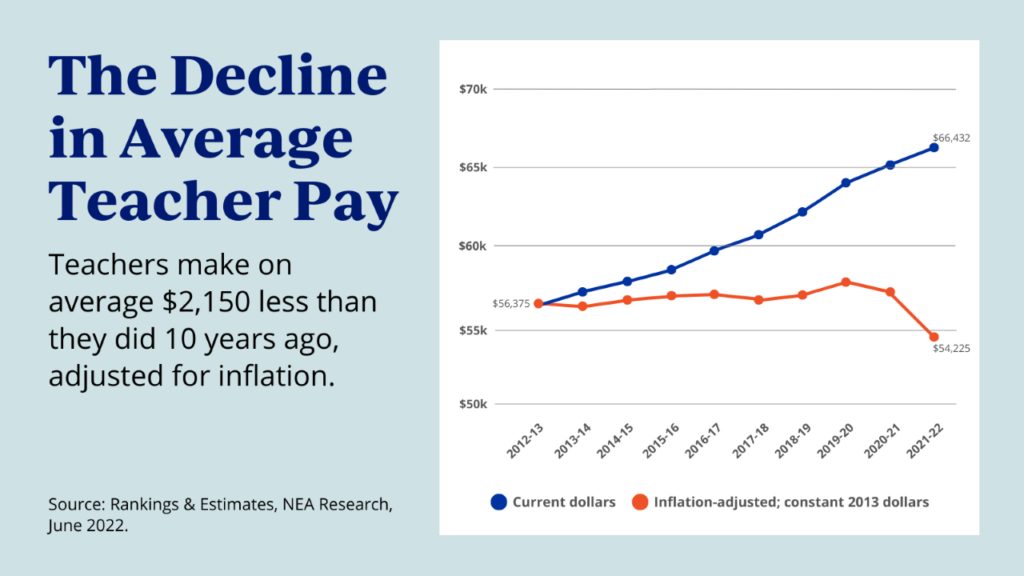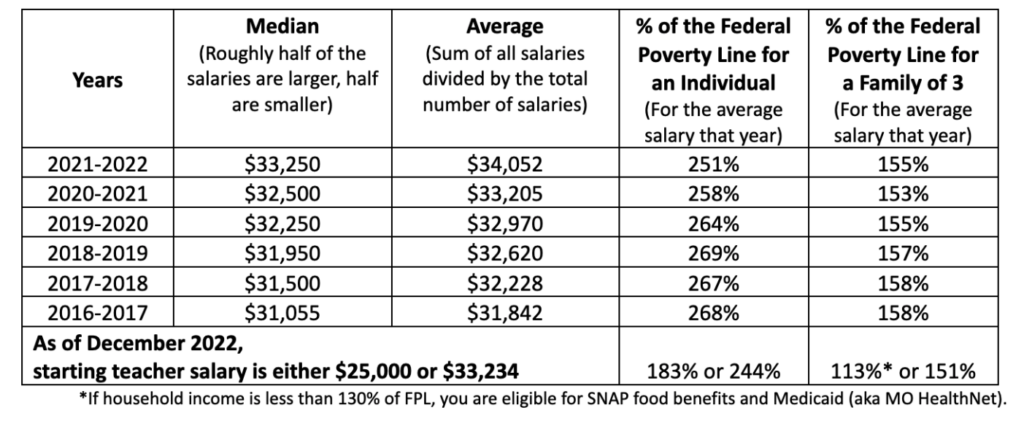Investing in Teachers = Investing in Education = Better Outcomes for us All.
Decades of research tell us that increasing our investment in education leads to safer and more prosperous communities. This includes higher salaries for individuals, higher employment rates, more economic opportunity, greater workforce effectiveness, and draws employers to the state who are seeking a talented workforce.
A 2020 analysis from The Learning Agency Lab showed that better learning outcomes can kick-start the economy and lead to large jumps in income. If you don’t care about a teacher’s personal economic situation, you likely do care about their impact on Missouri children’s economic potential.
Missouri needs to invest in education. When the education system improves, labor force skills and incomes increase. Boosting the American education system, then, presents a key opportunity for both policymakers and individuals.
Why Do We Care About Salaries?
We need good teachers to stay in the profession. This begins with the bare minimum of paying teachers enough money to meet their most basic needs.
As of 2021, 45% of educators within the United States have taken out personal student loans to pay for their education, with more than half of these teachers still facing an average outstanding balance of $58,700. Teachers also only make $0.72 for every $1.00 earned by other college-educated professionals with similar experience in their professions. This means we are asking teachers entering the profession with tens of thousands of dollars in debt to forgo other professional tracks where they know they would make over 25% more. Even in the best of times, that is not an easy choice.
Missouri is experiencing both a shortage of new teachers coming into the field, and an exodus of qualified teachers. A commission formed by the Missouri State Board of Education found that around 8% of Missouri’s available full-time teaching positions in the 2020-21 school year were either vacant or filled by individuals who were not fully qualified.
Near poverty-level salaries are driving people away from the profession. And as such, not just adequate, but attractive salaries will be a huge piece of recruiting and retaining qualified educators.
Teacher Salaries in the U.S. are Low and Not Improving
Professions like teaching, nursing, and childcare became the first professions available to and commonly taken by women in the U.S. Women’s participation in the economy has risen as gender equality has progressed. While laws were established to prohibit pay discrimination based on sex, there is still a need to keep focus on advancing women’s pay equality. Wage gaps have been slower to narrow, especially in professions with more women.
The gender composition of the teaching profession is still greatly female. Both the number of women entering teaching and the proportion of teachers who are female have gone up since the 1980s. The Department of Labor has analyzed the gender wage gap and data indicates that where women are overrepresented, women see below average wages and are less likely to have access to benefits and retirement plans compared to jobs held by men.

We ask a lot of our teachers in the U.S., arguably more than we would find reasonable in any other profession. 94% of our teachers spend their own money on supplies for their classrooms. In recent years, their jobs often include a constant threat of gun violence, and they have increasingly become the targets of anger from both parents and policymakers, while also navigating pandemic-related challenges. We ask teachers to do this while compensating the majority of them below what we know is a living wage.
Missouri Teacher Pay Is Even Lower
Missouri’s teacher pay is and has been dismal-we are in the bottom five in the country. For years, the pay earned by teachers (at all levels – K-12 as well as college and university faculty) has failed to keep pace with the rising cost of living. Too many teachers, including academic staff and support professionals, struggle to pay their bills (Table 2). The National Low Income Housing Coalition 2022 Out of Reach report tells us that someone working full-time in Missouri would need to make $16.94 an hour to afford a two-bedroom rental – which is more than the average teacher makes.

Missouri teacher pay has trailed inflation by a large margin. Since 2016, teacher salaries (median as well as average) have increased roughly 7%, while inflation has increased close to four times that. Housing is up 27%, food 26%, transportation 44%, and medical care is up 21%.
The state of Missouri requires school districts to pay a minimum teacher’s salary of $25,000 for a beginning teacher (the same it’s been since 2005 and the rough equivalent of a full-time job that pays $12 per hour – our new minimum wage) and a minimum salary of $33,000 for a full-time teacher with a master’s degree with at least ten years of public teaching experience. Missouri and Montana pay the lowest starting salaries in the U.S.
There was an optional grant available this year for participating school districts to supplement a teacher’s starting salary and increase it to $38,000. The program was designed to fund 70% of the cost of the difference, with the remaining 30% to be picked up by the district. The grants were only approved for this year. It is yet to be seen if our legislature will decide to sustain the program and appropriate the funding for another year.
What Can We Do About It? – Support Funding in Missouri…NOW
We must realize this crisis affects both rural and urban Missouri. I was thrilled to hear our House Speaker begin the 2023 legislative session acknowledging, “For too long, our teachers have been compensated by an out of date pay scale.” The urgent problem is simple. Teacher pay is too low and we need to compensate our teachers with a decent wage – enough to live on without struggling, but even beyond that to consider a wage competitive with other professions that require similar educational investment. A competitive starting salary, plus achievable increases and other incentives need to be considered for meaningful retention as well as recruitment.
We also need to be sure to center impacted people in any policy discussion. Missouri teachers will be able to share their professional experiences and personal perspectives. They will help policymakers understand the nuances of the various district scales, retirement packages, and other important considerations for finding viable and long-lasting solutions. Decades of evidence tell us the role teachers play is directly connected to our collective wellbeing – economically (better educational outcomes leads to better local economies) and socially (most of us can recall the huge impact of at least one great teacher that changed our lives for the better). Taking care of our teachers is taking care of all of us.
State Level Proposals
Missouri lawmakers have proposed a variety of bills for consideration this year to address challenges with teacher pay. Proposals include raising entry level minimums (much needed!) and other options that will likely have less impact on Missouri’s ability to attract and retain qualified teachers. HB 189, HB 433 y SB 19 propose increases to starting salaries with slight differences in the timeline for implementation.
HB 190 proposes creating differentiated teacher pay to help districts deal with hard-to-staff subject areas and schools, all at no additional cost to the state per the fiscal analysis. Any increased compensation is still at the discretion and the expense of the school district, which we know are also woefully underfunded.
HB 379 y HB 553 would authorize a one-time tax credit for teachers and staff. HB 578 establishes the “Matching Grants for Teachers Plan Fund” to match school district expenditures of reserve money to increase teacher salaries. As the name implies, the grant would require districts to withdraw funds from their reserves, if it has the funds to do so.
Federal Policy
The U.S. Congress has introduced The American Teacher Act that would establish an incentive program for states to raise the minimum salary of public school teachers to $60,000 and require annual increases that match the rise of inflation. The proposed legislation was sponsored by former educators and was co-authored by a nonpartisan organization.
This is the kind of jump needed to make a real difference in our ability to breathe life back into the profession. Our children and our future require such an investment. And our teachers are worth it.
We’ll be watching the federal legislation closely while we continue to fight for reforms that can help here in Missouri. To follow along with these bills and other anti-poverty legislation, you can subscribe to our Bill Trackers.
